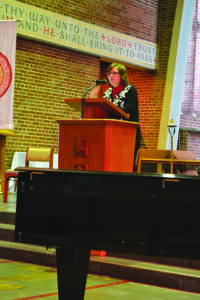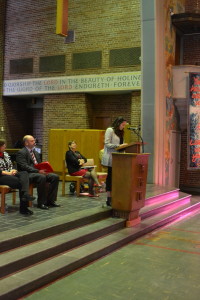 Last Thursday, Nov.12, following the resignation of former president Laurie Joyner, an all-campus gathering was held in Weaver Chapel to reflect on the Wittenberg mission and community through a time of transition. The gathering, put together by a group of students, staff and faculty, hosted speakers such as Mary Jo Zembar, interim provost and professor of psychology; Pastor
Last Thursday, Nov.12, following the resignation of former president Laurie Joyner, an all-campus gathering was held in Weaver Chapel to reflect on the Wittenberg mission and community through a time of transition. The gathering, put together by a group of students, staff and faculty, hosted speakers such as Mary Jo Zembar, interim provost and professor of psychology; Pastor
Rachel Tune, university pastor; Pastor Jonathon Eilert, secretary of the board of directors; Kayla Villegas, senior class president and Ed Hasecke, professor of political science.
“Our interest in calling for this gathering was to not only share specific information about the transition plan, but also to allow us to reflect briefly on where we came from, where we are now and where we are headed as a university in the future,” Zembar said.
“For me, this gathering is a statement that Wittenberg is much more than a contractual relationship. Wittenberg is more than a diploma and a paycheck; it’s a place where we build lifelong friendships,” Hasecke said during his speech.
The gathering was to discuss recent administrative decisions.
“We face challenges and part of the answer we have for that is obviously . . . budget cuts, but budget cuts are just a tool to get at our purpose,” Tune said.
On these challenges, Eilert spoke directly: “Let me say, on behalf of the board, we are sorry that the implementation of the necessary financial changes has brought pain and unrest to some of you and your colleagues.”
He affirmed Joyner’s deep care for the university, and acknowledged her role in creating a sustainable financial model.
“Her departure should not indicate a change in our resolve to implement a financial plan at Wittenberg that makes possible our best path forward,” Eilert said.
Considering the financial situation and changes in leadership, the question raised at the gathering was this: how will the Wittenberg community, motivated by its mission, band together around the challenges to turn them into opportunity?
“Our future will certainly be better to the degree that we value the work and contribution of all who are a part of this place, and that, day-to-day, we would strive to seek the best for one another, for our students and for all of us who are a part of this place for the purpose of the mission,” Tune said.
 For Villegas, the Wittenberg motto was lived out in student unity, the commitment of faculty and staff to students, and a commitment to service: “Putting others first is what made this university stand out. At Wittenberg, the tour guide spoke about how I could give back; it wasn’t about what the school could do for me, but what I could do for others.”
For Villegas, the Wittenberg motto was lived out in student unity, the commitment of faculty and staff to students, and a commitment to service: “Putting others first is what made this university stand out. At Wittenberg, the tour guide spoke about how I could give back; it wasn’t about what the school could do for me, but what I could do for others.”
“This is not true everywhere,” Hasecke said, noting a previous job in Cleveland. What makes him proud about Wittenberg is that it’s “a very special place that values community and the bonds between people that create social capital. Wittenberg is the people; it is the relationships.”
The community’s response was varied.
“I think [Joyner] did very well with the budget. She’s going to leave behind a great legacy,” senior Ryan King said.
“I feel like we’re not being given specific details about a lot of things,” sophomore Adam Headlee said. “I’ve heard the word ‘scapegoat’ used, that Joyner was brought in because they knew the cuts would be unpopular. I love Wittenberg, but I find it’s a trend that when big things happen, the administration isn’t always upfront about what’s going on. I’d appreciate if they were more transparent.”
“I appreciated the heartfelt messages,” Matthew Smith, professor of communication, said. “I look forward to having more of our questions answered moving forward. This was a good start to a conversation we have to have, but there is still more conversation.”
In fact, this is the start of a conversation, as smaller forums are being held to address the budget cuts and/or the vacated presidency. The first student forum will be Monday, Nov. 16.





